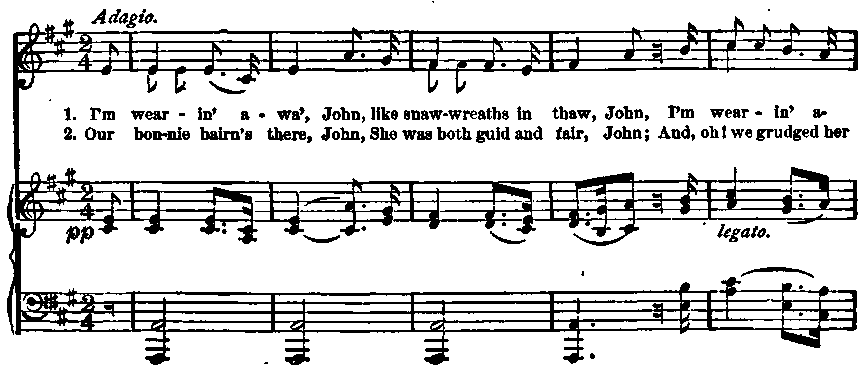Familiar Songs - Their Authors & Histories
300 traditional songs, inc sheet music with full piano accompaniment & lyrics.
| Share page | Visit Us On FB |
|
648 |
OUR FAMILIAR 80NG8. |
||
|
THE LAND O' THE LEAL.
This dearly-loved song was made by Baroness Nairne. It was written for an early friend of hers, Mrs. Archibald Campbell Colquhoun, a beautiful woman, and an old love of Walter Scott's. It was called forth by the death of Mrs. Colquhoun's only child, and was originally longer. Two stanzas were gradually dropped, and, in later years, when Lady Nairne's whole life became an expression of her religious emotions, she added the stanza:
" Sae dear that joy was bought, John, Sae free the battle fought, John, That sinfu' man e'er brought
To the Land o' the Leal."
When Lady Nairne was growing old, a friend urged her to give her some particulars of her composition. Of this one she wrote: " The ' Land of the LeaP is a happy rest for the mind in this dark pilgrimage. . . . Oh yes! I was young then. I was present when it was asserted that Burns composed it on his death-bed, and that he had it Jean instead of ' John'; but the parties could not decide why it never appeared in his works, as his last song should have done. I never answered."
The authorship of her poems was often discussed in her presence, and although she said once that she " had not Sir Walter's art of denying," she must have had more than ordinary control over her countenance and speech, as well as very faithful friends to keep her secrets; for although her songs were universal favorites, the source of many of them was unknown even to her kindred, until the close of her life. The year before her death, when she had reached her seventy-ninth year, Lady Nairne was in Edinburgh, the home of her happy married life, and also of the friend for whom she wrote this song, when one evening a young kinswoman, telling her unconsciously that she was about to play what she felt sure would please her, stirred deep memories and hopes in the breast of the aged gentlewoman with her own exquisite song about " The Land o' the Leal."
When Burns sent Thomson his song of " Scots wha hae wi' Wallace bled," asking that it might be set to the air called " Hey, tuttie, taittie," he said that he had shown the air to Urbani, who was highly pleased with it, and begged him to make soft verses for it. Burns never did so; but Lady Nairne's words are sung to that very air which we associate with one of the most stirring songs in existence,—with only the addition of an opening note. |
|||
 |
|||